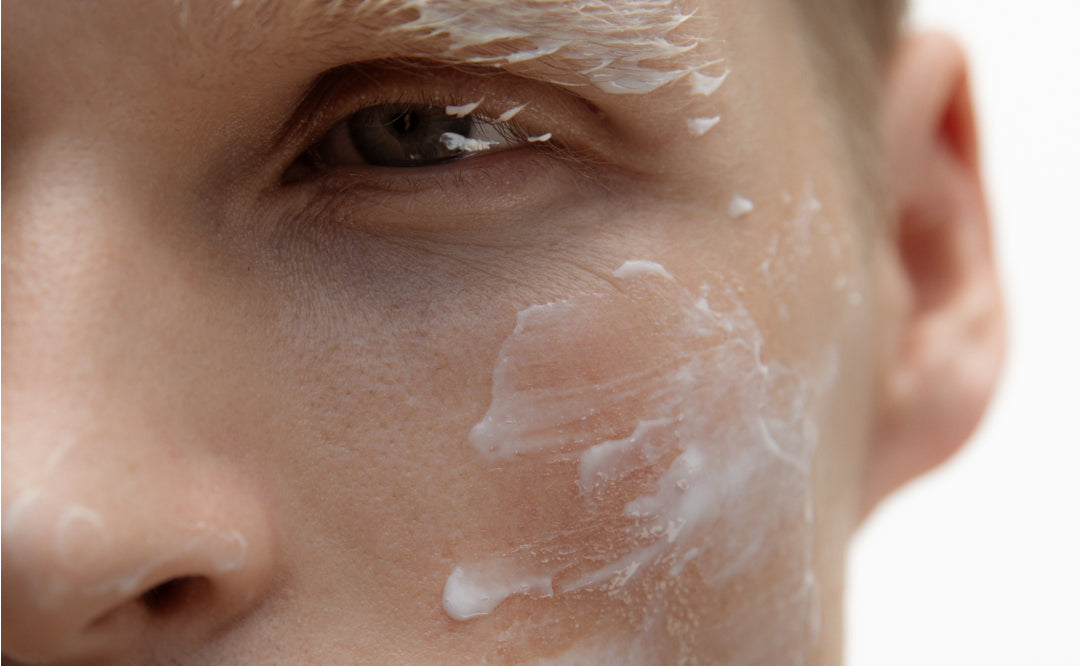
male versus female skin: how it differs and why it matters

the bottom line
as if there weren’t enough differences between men and women, we now have to think about how our skin differs, too. testosterone, facial hair, and sebum are just the beginning of the story. to learn more about why we shouldn’t be treating the guys as just another version of us, read on.
first layer: the main issue
Despite the recent surge in popularity of unisex skin care brands, men and women have some obvious differences in their anatomy, physiology, and disease tendencies. But what about our skin? Skin quality and skin diseases differ between the sexes too, with men having a larger number of skin infections, and women showing more pigmentation issues, autoimmune disorders, and allergic diseases.1 It turns out that as a result of our differences, we need to re-think our skincare, too.
second layer: the science
Most of the differences between the skin of men and women comes down to good, old hormones. Testosterone gives male skin a different structure, and generally makes it thicker and oilier with a tendency to age better. When we think about differences in skin from a more scientific level, it’s helpful look at a few specific parameters: hydration, transepidermal water loss, sebum production, skin thickness, and pH. It turns out that men and women differ in almost all of these areas, although the data is sometimes frustratingly conflicting.2
Hydration of the skin is critical not only for cosmetic reasons, but also because adequate hydration helps to regulate how cells in the epidermis (the outermost layer of the skin) grow, as well as inflammation of the skin.2 One study evaluated the skin of men and women during both the summer and winter and concluded that women have improved hydration of the skin as compared to men.3
Along the same lines, transepidermal water loss (TEWL) refers to the loss of water as it passes through the epidermis. The degree of TEWL is inversely related to the integrity of the skin’s barrier function which in turn helps the body to retain moisture. So, when TEWL increases, barrier function is typically impaired.4 The data conflicts a bit here: while some studies suggest that TEWL is lower in men (which should mean that their barrier function is better), most studies indicate that this is one area where there is true equality between the sexes.2 Huzzah!
Men tend to complain about pore size and oiliness, for good reason; their higher testosterone levels after puberty contribute to increased sebum production and more noticeable pores.5 As a result, they may continue to have acne into adulthood, with oilier skin. On the plus side (for the guys), adult men are less likely to have dry skin than women.
We tend to joke about men having thicker skin than women, but it turns out it’s a real thing. It’s been estimated that male skin is 10-20% thicker than that of females6, with a higher level of collagen. Men’s collagen content reduces at a regular rate after age 45, while in women the skin thins more rapidly after menopause.7 As a result, men may show signs of skin aging later than women, but when they appear, they tend to be more dramatic: think deeper grooves, heavier necks, and more pronounced under eye bags.
Finally, while the data is somewhat conflicting here too, male skin has shown a lower pH in most studies. This matters because lower skin pH has been associated with acne, oiliness, and redness of the skin.8 And that bar of soap you keep using on your face? It raises your skin pH, leading to dry skin and more evident wrinkling. So save the bar for your body, beauty.
third layer: the habits
Now that we’ve established that there are some basic differences at the physical level between the skin of women and men, it’s time to think about our skincare routines, which also tend to differ wildly. To start, most men don’t seem to have an established skincare routine. In fact, many admit to cleansing periodically with soap and water – when they remember to do so. Next, we have the wonderful enigma that is shaving. It’s been estimated that men who shave their faces do so an average of 16,000 times (!) over their lifetimes. While shaving could be seen as an extreme version of exfoliation, it also stresses the skin and causes it to become more sensitive. 40% of men report skin problems related to shaving, including cuts, razor burn, and ingrown hairs.9 Finally, men tend to skip the sunscreen, putting them at higher risk for UV-related skin aging and skin cancer.
fourth layer: the recommendations
We’ve used the terms male/female and men/women interchangeably in this blog, which is purely for simplicity. “Gender” is a word which has taken on different nuances and implications, and we respect that. Regardless of how you identify, we think it’s important that you have the tools you need to select the skin care that will work best for you. Keep in mind that if you’re taking estrogen- or testosterone-based supplements, your skin will reflect that, too. That being said, we recommend that you select your skin care based on the gender of your skin, which may or may not correlate with your gender at birth.
Careful shaving is obviously critically important. The skin should be well-lubricated to prevent nicks and cuts. Follow with gentle products which soothe irritated skin and consider anti-bacterial ingredients to help fight acne. For men who shave, it’s also important to limit the number of leave-on products which contain essential oils, as your skin is most vulnerable at this time. While we love essential oils for both their scents and their functional qualities, we recognize that most do contain allergens (which we report on each label). As a result, we very carefully titrate their concentrations in all of our products according to the rigorous standards set by the certifying bodies of the United Kingdom and European Union.
Finally, keep your moisturizers light – rich products won’t sit well on skin that’s been sensitized from shaving. And don’t forget the sunscreen (please).
about us: at anokha we firmly believe that men deserve their own specialized skin care. While some products will work well for both genders, products for men must be formulated very mindfully with great attention paid not only to the ingredients included, but also the concentrations. Now available, anokha man, with our rice & hinoki facial cleanser, white tea & lychee toner, and sake & sandalwood facial lotion.
All this and more at anokhaskincare.com .
xx
anokha
references:
- Chen W, Mempel M, Traidl-Hofmann C, Al Khusaei S, Ring J. Gender aspects in skin diseases. J Eur Acad Dermatol Venereol 2010; 24: 1378-1385.
- Rahrovan S, Fanian F, Mehryan P, Humbert P, Firooz A. Male versus female skin: What dermatologists and cosmeticians should know. Int J Wom Dermatol 2018; 4: 122-130.
- Li X, Galzote C, Yan X, Li L, Wang X. Characterization of Chinese body skin through in vivo instrument assessments, visual evaluations, and questionnaire: Influences of body area, inter-generation, season, sex, and skin care habits. Skin Res Technol 2014; 20: 14-22.
- sciencedirect.com
- Roh M, Han M, Kim D, Chung K. Sebum output as a factor contributing to the size of facial pores. Br J Dermatol 2006; 155: 890-894.
- Bailey SH, Oni G, Brown SA, et al. The use of non-invasive instruments in characterizing human facial and abdominal skin. Lasers Surg Med 2012; 44: 131-142.
- Leveque JL, Corcuff P, de Rigal J, Agache P. In vivo studies of the evolution of physical properties of the human skin with age. Int J Dermatol 1984; 23: 322-329.
- Schmid-Wendtner M-H, Korting HC. The pH of the skin surface and its impact on the barrier function. Skin Pharmacol Physiol 2006; 19(6): 296-302.
- https://www.thegreymensskincare.com



leave us a comment
This site is protected by hCaptcha and the hCaptcha Privacy Policy and Terms of Service apply.